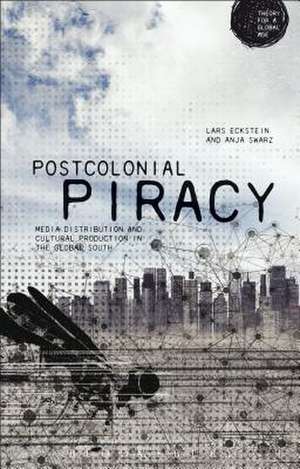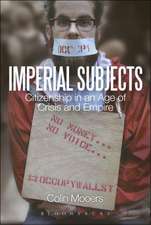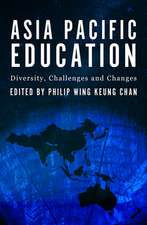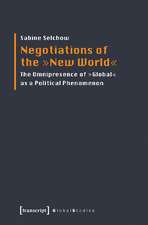Postcolonial Piracy: Media Distribution and Cultural Production in the Global South: Theory for a Global Age Series
Editat de Lars Eckstein, Anja Schwarzen Limba Engleză Hardback – 22 oct 2014
Preț: 568.95 lei
Preț vechi: 816.06 lei
-30% Nou
Puncte Express: 853
Preț estimativ în valută:
108.86€ • 113.68$ • 89.90£
108.86€ • 113.68$ • 89.90£
Carte tipărită la comandă
Livrare economică 16-30 aprilie
Preluare comenzi: 021 569.72.76
Specificații
ISBN-13: 9781472519429
ISBN-10: 1472519426
Pagini: 312
Dimensiuni: 138 x 216 x 19 mm
Greutate: 0.51 kg
Ediția:New.
Editura: Bloomsbury Publishing
Colecția Bloomsbury Academic
Seria Theory for a Global Age Series
Locul publicării:London, United Kingdom
ISBN-10: 1472519426
Pagini: 312
Dimensiuni: 138 x 216 x 19 mm
Greutate: 0.51 kg
Ediția:New.
Editura: Bloomsbury Publishing
Colecția Bloomsbury Academic
Seria Theory for a Global Age Series
Locul publicării:London, United Kingdom
Caracteristici
The global south is a growing area of interest for social and political scientists.
Notă biografică
Lars Eckstein is Professor of Anglophone Literatures and Cultures Outside of Britain and the U.S. at the University of Potsdam, Germany.Anja Schwarz is Professor of Cultural Studies, University of Potsdam, Germany.
Cuprins
Series Editor's Foreword Introduction: Towards a Postcolonial Critique of Modern PiracyPart 1 Conceptions: The Domain of Postcolonial Piracy 1 Revisiting the Pirate KingdomRavi Sundaram 2 Beyond Representation: The Figure of the PirateLawrence Liang3 On the Benefits of Piracy Volker Grassmuck4 'Dreaming with BRICs?' On Piracy and Film Markets in Emerging EconomiesShujen Wang Part 2 Reflections: Reframing the Discourse of Postcolonial Piracy 5 The Paradoxes of Piracy Ramon Lobato 6 Depropriation: The Real Pirate's Dilemma Marcus Boon 7 Keep on Copyin' in the Free World? Genealogies of the Postcolonial Pirate Figure Kavita Philip 8 Interrogating Piracy: Race, Colonialism and OwnershipAdam Haupt Part 3 Selections: The Work of Postcolonial Piracy 9 To Kill an MC: Brazil's New Music and its DiscontentsRonaldo Lemos 10 'Justice With my Own Hands': The Serious Play of Piracy in Bolivian Indigenous Music VideosHenry Stobart 11 Money Trouble in an African Art World: Copyright, Piracy and the Politics of Culture in Postcolonial MaliRyan Thomas Skinner 12 Hacking and Difference: Reflections on Authorship in the Postcolonial Pirate Domain Satish Poduval Index
Recenzii
Is piracy good or is it bad? Hundreds of articles and books have sought to answer to this question and what makes Postcolonial Piracy so important is that it ignores it altogether. Instead, these authors see piracy as spilling beyond the legal domain to give rise to sets of cultural practices that are central to the operation of media cultures in the postcolonial world. The book combines conceptual discussions of piracy and the figure of the pirate with a focus on the everyday life of cultures of copying in Mali, India, Brazil and elsewhere. It is a volume that will be widely read, not just by those interested in intellectual property, but by those interested in postcolonial media worlds and postcolonial society.


















